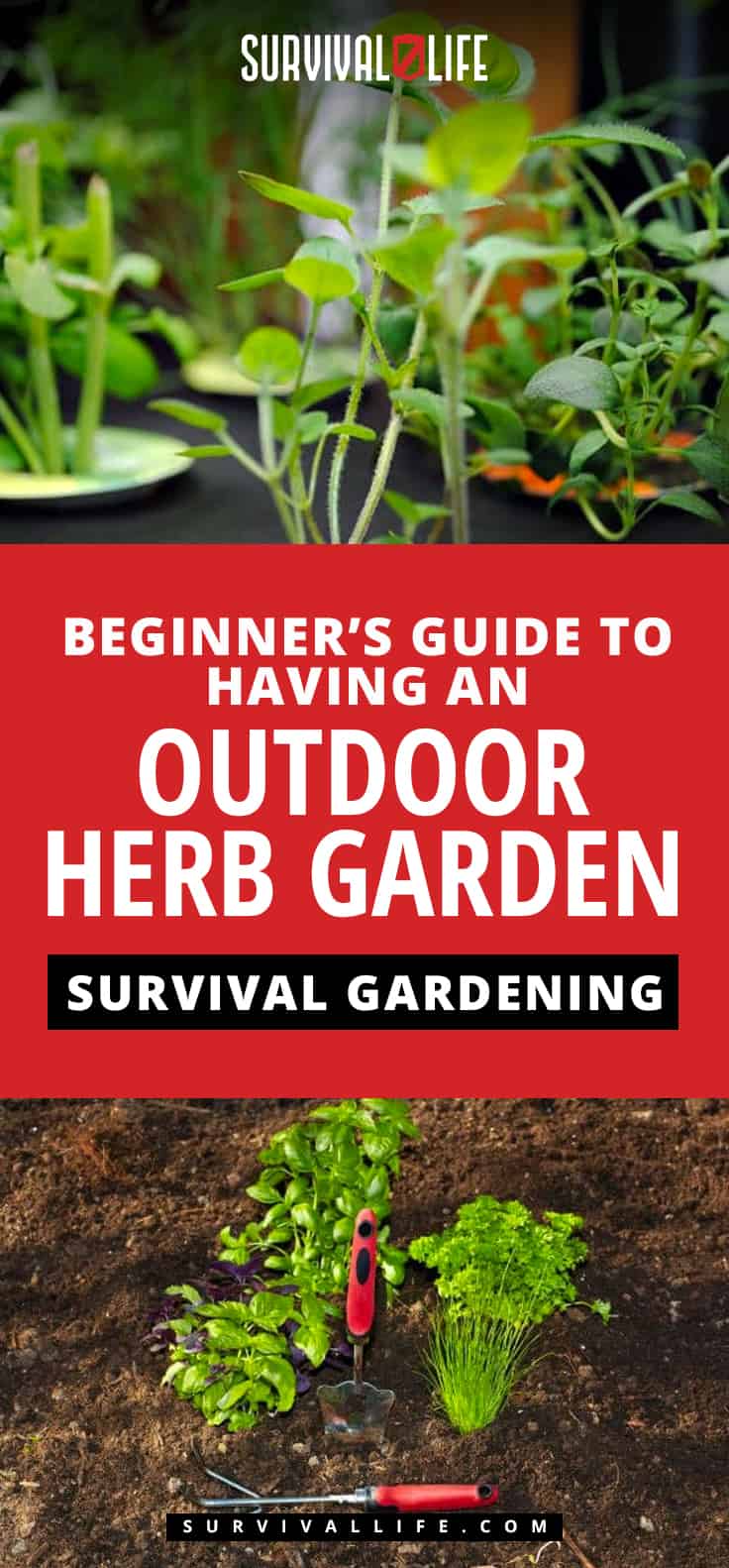Featured Articles
Outdoor Herb Garden | A Beginner’s Guide To Survival Gardening

Grow an outdoor herb garden and harvest essentials for your survival at any time, from food to natural herbal treatments.
RELATED: 20 Survival Gardening Plants For Spring
How to Grow an Outdoor Herb Garden for Survival
Why Grow an Outdoor Herb Garden
A productive outdoor herb garden is not only feasible but is a great addition to any survival garden! Not only are herbs a tasty addition to the meals you prepare for yourself and your family but they are also packed with essential medicinal properties.
They are proven beneficial for many ailments such as stomach upset and skin conditions such as psoriasis, muscle aches, joint inflammation, and MUCH MORE! As a food ingredient, the abundant vitamins and minerals contained in the plants will help boost your immunity and overall health needed for survival.
What to Grow in Your Outdoor Herb Garden
Last gardening season I wrote 5 Herbs for Your Survival Garden. In this article, I shared detailed information on five of the most popular herbs gracing almost every survival garden you’ll come across.
If you love basil, cilantro, lemon balm, oregano, and parsley, then check out my previous article on these five extremely versatile herbs!
If you are new to survival gardening and aren’t quite sure where to start with your outdoor herb garden, don’t worry. We can help!
Tips for Growing a Herb Garden
First, let’s go over some basic herb care and other information to better understand the process of planting herbs outdoors. Did you know?
- Herbs are extremely easy to care for! Most herbs only require just a few hours of sunshine per day, well-draining soil, and a little compost.
- Herbs love to grow in the ground. Some herbs have been known to reach heights and/or widths of 4-6 feet when planted in the ground!
- If you are limited on space, then check out my article Tips for Growing Food in Small Spaces. Indoor Herb Gardening is another great option as well.
- As I said before, herbs are extremely easy to care for but, the proper location is key. Most herbs like full sun.
- If the regular summer temperatures in your location exceed 90°F on a regular basis, find an area for them where they’ll receive morning sun and shady afternoons. Most herbs require about 3-4 hours of full sun a day.
How to Grow Herbs Outdoors | Herb Gardening for Beginners
Now we covered the basics of outdoor herb garden care, let’s go a little further and talk about the next steps to take to make your outdoor herb garden dream a reality!
1. Layout Your Outdoor Herb Garden
As I mentioned before, some herb plants have been known to reach heights and/or widths of 4-6 feet when planted in the ground with ideal conditions. Therefore, planning for adequate space for each herb’s potential growth is important.
Here is a ‘rule of thumb’ for the space recommended for these commonly planted herbs:
- 1-2 feet: Parsley, Cilantro, Dill, and Chives
- 2-3 feet: Savory, Basil, Tarragon, and Thyme
- 3-4 feet: Marjoram, Rosemary, Oregano, Sage, and Mints
RELATED: Survival Gardening Hacks | Bringing It Back To The Basics
2. Prepare the Soil
Proper soil preparation is the most important step! To get started, loosen the soil with a large garden fork.
This allows for proper water drainage for your herb plants and allows their individual root systems to grow to their full potential. Next, add about an inch of compost to the soil and mix well into the soil.
This will help your herb plants to have proper water drainage and will add an all-natural fertilizer which will greatly benefit your herb plants as they grow!
Check out my previous article, composting for Beginners, for more details on how you can get started with the process of composting!
3. Plant Your Herbs
Plant your starter plants right into the ground in the space you set up for them. For beginners, I recommend starter plants over seeds because it’s just a head start both you and your new herb plants will appreciate.
You can buy the starter plants at any plant nursery.
Caring for Your Herb Plants
Water your plants when 2 inches below the soil’s surface becomes dry. Since not every climate is the same, the time it takes for the soil to dry out varies.
Therefore, you should check the soil often. DO NOT OVER WATER YOUR HERB PLANTS. Some beginners tend to think “more water the better,” which is simply not true.
Overwatering your herb plants can lead to unhealthy plant conditions over time and can even lead to disease. Check out these Survival Seeds Playing Cards which includes a how-to guide for growing enough food when SHTF.
A Little Down The Road… When To Harvest
The best part of caring for your herb garden and watching the plants thrive (at least for me) is harvest time! You take care of your plants, they take care of you!
When your plant reaches 6-8” tall, cut off approximately ⅓ of each branch. When you cut close to a leaf intersection, the herb plants will then start the regrowing process.
Some herb plants, however, grow their leaves at their center in which case, remove the oldest branches completely. Leave any new growth.
For gardening beginners, start with perennial herbs and learn how-to in this video from eHow Garden:
As you go along and get to know your plants and how they grow, the process of how and when to harvest each plant will become more and more clear. Happy gardening, everyone!
Have you any herb growing in your garden now? Let us know how your outdoor herb garden is doing so far in the comments section below!
Up Next:
- 10 Powerful Medicinal Plants From Around The World
- Medicinal Plants You Need To Make Natural Home Remedies
- Composting For Beginners | The Building Blocks To A Better Harvest
Make sure your survival gear is fully stocked with the latest and check out the Survival Life Store!
Follow us on Facebook, Instagram, Twitter, Pinterest, and Tumblr!
***Disclaimer: The contents of this article are for informational purposes only. Please read our full disclaimer.***

Editor’s Note: This post was originally published on March 20, 2017, and has been updated for quality and relevancy.
-

 Do It Yourself7 months ago
Do It Yourself7 months agoParacord Projects | 36 Cool Paracord Ideas For Your Paracord Survival Projects
-

 Do It Yourself9 months ago
Do It Yourself9 months agoHow To Make Paracord Survival Bracelets | DIY Survival Prepping
-

 Do It Yourself9 months ago
Do It Yourself9 months ago21 Home Remedies For Toothache Pain Relief
-

 Do It Yourself10 months ago
Do It Yourself10 months agoSurvival DIY: How To Melt Aluminum Cans For Casting
-

 Exports8 months ago
Exports8 months agoAre Switchblades Legal? Knife Laws By State


Pingback: Beneficial Insects For The Garden: Good Bugs Vs. Bad Bugs
Pingback: Companion Plants To Benefit Your Survival Garden
Pingback: 5 Tactical Tips To Maneuver Like An Elite Operator
Pingback: Power Grid Down | DOE Warns Cyber Attacks Could End America As We Know It
Pingback: Efficient Butchering: Three Tips from a Lifelong Hunter to get the most from your kill
Pingback: How To Skin A Deer Correctly | Survival Life
Pingback: 4 Organic DIY Insect Sprays For Your Survival Garden
Pingback: 5 Tactical Tips To Maneuver Like An Elite Operator - Survive!
Pingback: 5 Tactical Tips To Maneuver Like An Elite Operator | survivalisthandbook.com
Pingback: 15 Incredible Medicinal Herbs For Your Indoor Garden
Pingback: 11 Natural Ways To Rid Your Home of Roaches For Good - Survive!
Pingback: 11 Natural Ways To Rid Your Home of Roaches For Good
Pingback: Efficient Butchering: Three Tips from a Lifelong Hunter | survivalisthandbook.com
Pingback: Efficient Butchering: 3 Tips from a Lifelong Hunter - Survive!
Pingback: Survival Gardening - How To Grow Lettuce Indoors
Pingback: 15 Incredible Medicinal Herbs For Your Indoor Garden | Survival Life
Pingback: 15 Incredible Medicinal Herbs For Your Indoor Garden – Ultimate Survival Alerts
Pingback: The Top 5 Ultimate Medicinal Herbs For Your Bug Out Bag | Survival Life
Pingback: 6 Adaptogenic Herbs to Relieve Stress in the Wilderness | Survival Life
Pingback: 6 Adaptogenic Herbs To Relieve Stress In The Wilderness - Survival Patch